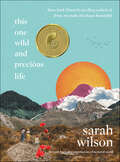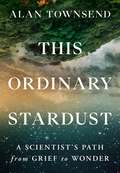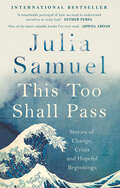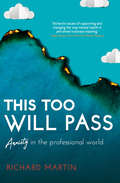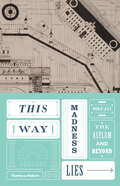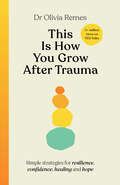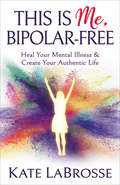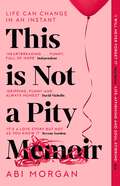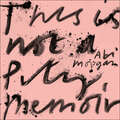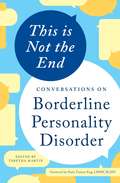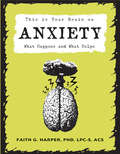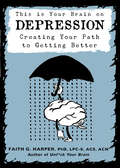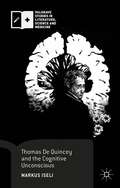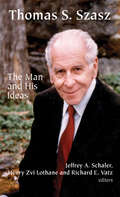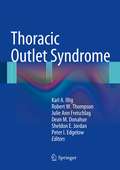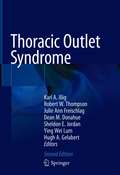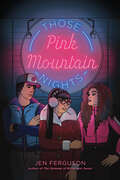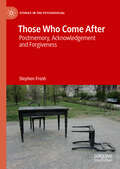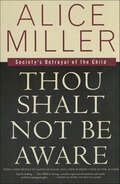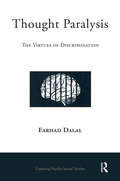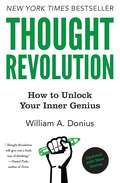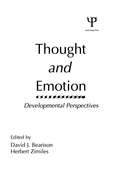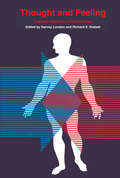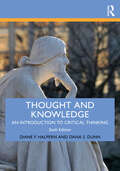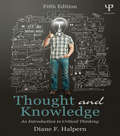- Table View
- List View
This One Wild and Precious Life: The Path Back to Connection in a Fractured World
by Sarah WilsonAs seen in USA Today's hottest releases and The Washington Post's 10 New Books Spotlight“Sarah Wilson is a force of nature – quite literally. She has taken her pain and grief about our sick and troubled world and alchemized it into action, advocacy, adventure, poetry, and true love.” — ELIZABETH GILBERTWake up and reclaim your one wild and precious life. New York Times bestselling author Sarah Wilson shows you how in this radical spiritual guidebook, the book we need NOW.Many of us are living with the sense that things are not right with the world and are in a state of spiritual PTSD. We have retreated, morally and psychologically; we are experiencing a crisis of disconnection—from one another, from our true values, from joy, and from life as we feel we are meant to be living it. Sarah Wilson argues that this sense of despair and disconnection is ironically what unites us—that deep down, we are all feeling that same itch for a new way of living. Drawing on science, literature, philosophy and the wisdom of some of the world’s leading experts, and her personal journey, Wilson offers a hopeful path forward to the life we love. En route, she shows us how to wake up and reconnect with life using “wild practices” that include:· Hike. Embrace the “walking cure” as great minds throughout history have.· Go to your edge. Do what scares you and embrace discomfort daily.· #Buylesslivemore. Break the cycle of mindless consumption and get light with your life.· Become a soul nerd. Light up your intellect with the arts.· Get “full-fat spiritual”. Have an active practice and use it to change the world.· Practice wild activism. Through sustained, non-violent protest we can create our better world.The time has come to boldly, wildly imagine better. We are being called upon, individually and as a society, to forge a new path and to find a new way of living. Will you join the journey?
This Ordinary Stardust: A Scientist's Path from Grief to Wonder
by Alan Townsend"[A] remarkable account of a shifting consciousness&” - Publisher&’s Weekly, starred review &“An extraordinary, powerful book&” - David Quammen, author of The Heartbeat of the Wild and Breathless A compassionate exploration of scientific wonder that offers &“a fresh perspective on life, death, and the bittersweet consequences of impermanence,&” (Jon Krakauer) as illuminated through the tragic dual cancer diagnoses of author Dr. Alan Townsend&’s wife and daughter. A decade ago, Dr. Alan Townsend&’s family received two unthinkable, catastrophic diagnoses: his 4-year-old daughter and his brilliant scientist wife developed unrelated, life-threatening forms of brain cancer. As he witnessed his young daughter fight during the courageous final months of her mother&’s life, Townsend – a lifelong scientist – was indelibly altered. He began to see scientific inquiry as more than a source of answers to a given problem, but also as a lifeboat: a lens on the world that could help him find peace with the painful realities he could not change. Through scientific wonder, he found ways to bring meaning to his darkest period. At a time when society&’s relationship with science is increasingly polarized while threats to human life on earth continue to rise, Townsend offers a balanced, moving perspective on the common ground between science and religion through the spiritual fulfillment he found in his work. Awash in Townsend's electrifying and breathtaking prose, THIS ORDINARY STARDUST offers hope that life can carry on even in the face of near-certain annihilation.
This Too Shall Pass: Stories of Change, Crisis and Hopeful Beginnings
by Julia SamuelA leading therapist shares memorable patient stories to explore the key crises in life and what we can learn from them.If change is the natural order of things, why do so many people struggle with the milestones of life--from first jobs and first loves to children leaving home and retirement?We live in a culture of limitless choice--and life is now more complex than ever. In This Too Shall Pass, acclaimed psychotherapist Julia Samuel draws on hours of conversations with her patients to show how we can learn to adapt and thrive during our most difficult and transformative experiences. Illuminated by the latest social and psychological research, this book unflinchingly deals with the hard times in family, love, work, health and identity.From a woman deciding whether to leave her husband for a younger lover, to a father handling a serious medical diagnosis. And from a new mother struggling with the decision to return to work, to a young man dealing with the aftermath of coming out, and a woman starting over after losing her job.These twenty powerful, unforgettable and deeply intimate stories about everyday people will inform our understanding of our own unique response to change and enlighten the way we approach challenges at every stage of life.
This Too Will Pass: Anxiety in a Professional World (Inspirational Series)
by Richard MartinWhat happens when your world falls apart? How do you start again?By all markers, Richard’s life was a success: he was happily married, a great father, and lived a fulfilling life, professionally and personally. But the pressures of a highflying legal career, his increasing social commitments, and family illness all took their toll.Richard pulls no punches in describing his breakdown and the crushing social anxiety that left him scared to even answer the front door. As his life crumbled around him, Richard fought hard to get to grips with the mental illness taking over his life.This is his inspirational story …
This Way Madness Lies: The Asylum and Beyond
by Mike Jay<P> A compelling and evocatively illustrated exploration of the evolution of the asylum, and its role in society over the course of four centuries This Way Madness Lies is a thought-provoking exploration of the history of madness and its treatment as seen through the lens of its proverbial home: Bethlem Royal Hospital, London, popularly known as Bedlam. The book charts the evolution of the asylum through four incarnations: the eighteenth-century madhouse, the nineteenth century asylum, the twentieth-century mental hospital, and the post-asylum modern day, when mental health has become the concern of the wider community. The book reveals the role that the history of madness and its treatment has played in creating the landscape of the asylum, in all its iterations. <P> Moving and sometimes provocative illustrations sourced from the Wellcome Collection's extensive archives and the Bethlem Royal Hospital's archive highlight the trajectory of each successive era of institution: founded in the optimistic spirit of humanitarian reform but eventually dismantled amid accusations of cruelty and neglect. Each chapter concludes with a selection of revealing and captivating artwork created by some of the inmates of the institutions of that era. <P> This Way Madness Lies highlights fundamental questions that remain relevant and unresolved: What lies at the root of mental illness? Should sufferers be segregated from society or integrated more fully? And in today’s post-asylum society, what does the future hold for a world beyond Bedlam?
This is How You Grow After Trauma: Strategies for Resilience, Confidence, Healing & Hope
by Olivia RemesDuring the storm, pick up this book. Whatever the trauma or disappointment, learn how to shift your mindset from concerned to in control; restless to relaxed; stressed to soothed.From leading mental health expert Dr. Olivia Remes, this essential companion for navigating life's challenges offers everyday techniques and exercises to overcome setbacks and even achieve positive change.Whether you're dealing with job uncertainty, ill health, relationship problems, financial or mental health struggles, or the loss of a loved one, this highly practical and compassionate book will help you find meaning amidst the chaos and reset your life.Distilling cutting-edge science and psychology, and backing it up with examples of everyday people who have overcome the odds by harnessing their inner strength, This is How You Grow After Trauma offers a clear 5-step path toward healing from trauma and setbacks.This is your trusted, pocket-sized guide for how to turn hardship into healing and become your truest, calmest self.
This is Me, Bipolar-Free: Heal Your Mental Illness & Create Your Authentic Life
by Kate LaBrosseThis Is Me, Bipolar-Free offers readers relief from their mental illness and helps them no longer be controlled by it. Traditional therapy and medications can only take a person as far as they can, and fear of the next relapse still lays wake in that individual. People look for a beacon of hope to help fully heal them from their disorder. Within This Is Me, Bi-Polar Free, readers learn that true healing is truly possible, finding joy is a part of the healing process, how to use food and supplements to heal the bring one’s body back into balance, and so much more. Kate LaBrosse guides readers through a journey of transformation and healing to help them back to their own. Furthermore, This Is Me, Bipolar-Free is a course to help one fully heal their disorder and find the true power within.
This is Not a Pity Memoir: The heartbreaking and life-affirming bestseller from the creator of ERIC
by Abi MorganBoth very funny and as propulsive as a thriller . . . impossible to put down' RACHEL COOKE, Observer'The kind of book you will find yourself saying urgently, over and over, to friends: 'Have you read it?' CAITLIN MORAN'Gripping, funny and always honest' DAVID NICHOLLS'Extraordinary . . . utterly compelling and so honestly told' NIGELLA LAWSON'Truly breathtaking. I could not have loved it more' CAREY MULLIGAN________________________An ordinary day.The end of ordinary life.One morning in June, Abi had her to-do list - drop the kids to school, get coffee and go to work. Jacob had a bad headache so she added 'pick up steroids'. She returned home and found the man she loved and fought and laughed with for twenty years lying on the bathroom floor. And nothing would ever be the same again. But this is not a pity memoir. It's about meeting your person. And crazed late night Google trawls. It's about the things you wished you'd said to the person that matters then wildly over-sharing with the barista who doesn't know you at all. It's about sushi and the wrong shoes and the moments you want to shout 'cut'. It's about the silence when you are lost in space and the importance of family and parties and noise. It's the difference between surviving and living. It's a reminder that, even in the worst times, there is light ahead. It's a love story.
This is Not a Pity Memoir: The heartbreaking and life-affirming bestseller from the writer of The Split
by Abi MorganAn ordinary day.The end of ordinary life. One morning in June, Abi had her to-do list - drop the kids to school, get coffee and go to work. Jacob had a bad headache so she added 'pick up steroids'. She returned home and found the man she loved and fought and laughed with for twenty years lying on the bathroom floor. And nothing would ever be the same again. But this is not a pity memoir. It's about meeting your person. And crazed late night Google trawls. It's about the things you wished you'd said to the person that matters then wildly over-sharing with the barista who doesn't know you at all. It's about sushi and the wrong shoes and the moments you want to shout 'cut'. It's about the silence when you are lost in space and the importance of family and parties and noise. It's the difference between surviving and living. It's a reminder that, even in the worst times, there is light ahead. It's a love story. (P) 2022 Hodder & Stoughton Limited
This is Not the End: Conversations on Borderline Personality Disorder
by Tabitha MartinWithin these pages, you'll find an honest portrait of what it's like to live with BPD, from the perspective of people with BPD and their loved ones--spouses, siblings, and parents, as well as mental health professionals. By turns heartbreaking and inspiring, this collection of real-life stories, personal essays, and candid interviews explores what a Borderline Personality Disorder diagnosis looks like--from the inside. Also featuring an in-depth overview of BPD and its common treatment methods, this book is a necessary tool for expanding your self-exploration and deepening your understanding of this confusing and often destructive disorder. Edited by mental health advocate Tabetha Martin and featuring a foreword by Paula Tusiani-Eng, co-author of the classic BPD memoir Remnants of a Life on Paper, This is Not the End: Conversations on Borderline Personality Disorder provides encouragement and support for all who are seeking to heal and recover from BPD.
This is Your Brain on Anxiety: What Happens and What Helps (Five Minute Therapy #2)
by Faith HarperAnxiety .... it's the worst. Choking, stifling, smothering, tingling, panicking, brain cutting out, bad decisions... You're a human being, so you know exactly what's being said here. Dr. Faith lays it all out in her five-minute therapy series: what anxiety IS (did you know that people wrote about it more in the 1800s than now?), what it's good for (that's right, it's actually a necessary response that helps to keep us alive in bad situations), how to know when it's gone overboard, and practical tips on how to deal with anxiety when it gets bad. This book is a lifesaver for panic attacks, breaking out of flight-or-fight-or-freeze responses, and for chronic anxiety. It's also good for folks who aren't burdened by anxiety daily but want to cope better with those tough life situations that affect us all. Read this and breathe!
This is Your Brain on Depression: Creating Your Path to Getting Better (Five Minute Therapy #4)
by Faith HarperPeople who have never been depressed have no idea what it's like. And people who have know all too well how tough depression can be to live with. Dr. Faith explains the brain science behind depression (complete with Zuul references) and talks you through the different options out there for getting better. Because yes there are things you can do to feel good again (including drugs but avoiding spiraling successions of drug cocktails). If you need solid expert advice from someone who can also make you laugh your ass off, this book's for you!
Thomas De Quincey and the Cognitive Unconscious (Palgrave Studies in Literature, Science and Medicine)
by Markus IseliThis book examines Thomas De Quincey's notion of the unconscious in the light of modern cognitive science and nineteenth-century science. It challenges Freudian theories as the default methodology in order to understand De Quincey's oeuvre and the unconscious in literature more generally.
Thomas S. Szasz: The Man and His Ideas
by Jeffrey A. Schaler Henry Zvi Lothane Richard E. VatzAs it entered the 1960s, American institutional psychiatry was thriving, with a high percentage of medical students choosing the field. But after Thomas S. Szasz published his masterwork in 1961, The Myth of Mental Illness, the psychiatric world was thrown into chaos. Szasz enlightened the world about what he called the “myth of mental illness.” His point was not that no one is mentally ill, or that people labeled as mentally ill do not exist. Instead he believed that diagnosing people as mentally ill was inconsistent with the rules governing pathology and the classification of disease. He asserted that the diagnosis of mental illness is a type of social control, not medical science. The editors were uniquely close to Szasz, and here they gather, for the first time, a group of their peers—experts on psychiatry, psychology, rhetoric, and semiotics—to elucidate Szasz’s body of work. Thomas S. Szasz: The Man and His Ideas examines his work and legacy, including new material on the man himself and the seeds he planted. They discuss Szasz’s impact on their thinking about the distinction between physical and mental illness, addiction, the insanity plea, schizophrenia, and implications for individual freedom and responsibility. This important volume offers insight into and understanding of a man whose ideas were far beyond his time.
Thoracic Outlet Syndrome
by Julie Ann Freischlag Dean M. Donahue Karl A. Illig Peter I. Edgelow Robert W. Thompson Sheldon E. JordanThoracic Outlet Syndrome is an essential reference for physicians involved in the diagnosis, referral and treatment of the condition. Thoracic outlet syndrome (TOS) is made up of a constellation of problems resulting from pathology at the thoracic outlet in the neck. Busy specialty practice see multiple affected patients in every clinic, however TOS can often be difficult to diagnosis. This book explores all possible ancillary care issues surrounding this complex condition, including rehabilitation, disability, natural history, and medicolegal issues, and aims to stimulate research, discussion, and a sense of community between professionals involved in this area. Vascular, thoracic, and neurosurgeons, neurologists, psychiatrists and psychologists, physical therapists, occupational medicine specialists, and pain specialists alike, will find this book to be a must have for successfully treating, referring and diagnosing TOS in clinical practice.
Thoracic Outlet Syndrome
by Julie Ann Freischlag Dean M. Donahue Karl A. Illig Robert W. Thompson Sheldon E. Jordan Ying Wei Lum Hugh A. GelabertThis extensively revised edition is an essential reference for physicians involved in the diagnosis, referral and treatment of the thoracic outlet syndrome (TOS). TOS is made up of a constellation of problems resulting from pathology at the thoracic outlet in the neck. Busy specialty practice sees multiple affected patients in every clinic, but TOS can often be difficult to diagnosis. Thoracic Outlet Syndrome explores all possible ancillary care issues surrounding this complex condition, including rehabilitation, disability, natural history and medicolegal issues, and aims to stimulate research, discussion and a sense of community between professionals involved in this area. Vascular and thoracic surgeons, neurosurgeons, neurologists, psychiatrists and psychologists, physical therapists, occupational medicine specialists and pain specialists will find this book a must read for successful treatment, referral and diagnosis of TOS in clinical practice.
Those Pink Mountain Nights
by Jen FergusonIn her remarkable second novel following her Governor General’s Award-winning debut, The Summer of Bitter and Sweet, Jen Ferguson writes about the hurt of a life stuck in past tense, the hum of connections that cannot be severed, and one week in a small, snowy town that changes everything. Overachievement isn’t a bad word—for Berlin, it’s the goal. She’s securing excellent grades, planning her future, and working a part-time job at Pink Mountain Pizza, a legendary local business. Who says she needs a best friend by her side?Dropping out of high school wasn’t smart—but it was necessary for Cameron. Since his cousin Kiki’s disappearance, it’s hard enough to find the funny side of life, especially when the whole town has forgotten Kiki. To them, she’s just another missing Native girl.People at school label Jessie a tease, a rich girl—and honestly, she’s both. But Jessie knows she contains multitudes. Maybe her new job crafting pizzas will give her the high-energy outlet she desperately wants.When the weekend at Pink Mountain Pizza takes several unexpected turns, all three teens will have to acknowledge the various ways they’ve been hurt—and how much they need each other to hold it all together. Jen Ferguson burst onto the YA scene with her first novel, which was a William C. Morris Award Finalist and a Stonewall Award Honor Book, and this second novel fulfills her promise as one of the most thoughtful and exciting YA writers today.
Those Who Come After: Postmemory, Acknowledgement and Forgiveness (Studies in the Psychosocial)
by Stephen FroshThis book explores the legacies of suffering in relation to ‘those who come after’ – the descendants of victims, survivors and perpetrators of traumatic events. It draws on recent discussions of ‘postmemory’ and ‘haunting’ that are concerned mainly with the transgenerational impact of personal and social trauma. It examines how we are connected to past events for which we have no direct responsibility yet in which we might in some way be ‘implicated’ and it asks how we might attain a position of active witnessing that helps resolve the suffering of others. Those Who Come After includes vivid accounts of witnessing from a variety of perspectives, ranging from Biblical and Jewish stories to contemporary art and music. The book draws on psychosocial studies and psychoanalysis to help make sense of this material and to develop an understanding of acknowledgment and responsibility that is both ethical and emancipatory. Those Who Come After will be of great interest to readers in psychosocial studies and psychoanalysis and to all who are concerned with the question of how to put past suffering to rest.
Thou Shalt Not Be Aware: Society's Betrayal of the Child
by Alice MillerA strong criticism of Sigmund Freud’s research regarding sexually abused children, from the bestselling author of The Drama of the Gifted Child.Originally published in 1984, Thou Shalt Not Be Aware explodes Freud’s notions of “infantile sexuality” and helps to bring to the world’s attention the brutal reality of child abuse, changing forever our thoughts of “traditional” methods of child-rearing. Dr. Alice Miller exposes the harsh truths behind children’s “fantasies” by examining case histories, works of literature, dreams, and the lives of such people as Franz Kafka, Virginia Woolf, Gustave Flaubert, and Samuel Beckett. Now with a new preface by Lloyd de Mause and a new introduction by the author, Thou Shalt Not Be Aware continues to bring an essential understanding to the confrontation and treatment of the devastating effects of child abuse.Praise for Thou Shalt Not Be Aware“Epoch-making . . . Alice Miller’s courage, warmth, experienced intuition and candor yield fascinating insights.” —The Boston Globe“A provocative critique of traditional therapy’s view of childhood . . . This is explosive stuff. I can’t imagine anyone coming away from this book without several newfound discoveries about herself and her relation to her parents.” —Glamour“Thou Shalt Not Be Aware is that rarest of gems, a highly creative and exciting work which throws a multifaceted light upon the development of human nature in the Western World.” —Ashley Montagu“Alice Miller is not out to “hang the bastards,” but rather to help create a world of self-conscious and self-loving individuals who don’t need, want or know how to abuse others.” —San Francisco Chronicle“It is timely. It is powerful. It is painful . . . absorbing, enlightening and provoking.” —Charlotte Observer
Thought Paralysis: The Virtues of Discrimination (Exploring Psycho-social Studies)
by Farhad DalalGiven the enormous struggles, efforts and money expended on the equalities enterprise, why has more progress not been made? And further, why have things actually become worse in some circumstances? It is argued this has occurred because:- The values of Equality have been bureaucratized, allowing the liberal principle of "live and let live" to be perverted and put in the service of fear and control.- The Diversity discourse has been hijacked by the libertarians and put in the service of increasing profit, under the guise of liberty and inclusivity.- The equality movements have become apolitical, sidetracked into the project of the indiscriminate celebration and preservation of cultures, in lieu of challenging the status quo within cultures as much as between them.- The versions of psychology and sociology that the equality movements have drawn on are over simple
Thought Revolution - Updated with New Stories: How to Unlock Your Inner Genius (Thought Revolution Ser.)
by William A. DoniusDiscover your hidden brainpower with this newly expanded guide to the simple but powerful technique that unlocks potential in all areas of your life.Former banker and CEO Bill Donius drove his bank's eightfold growth over twelve years. And the surprising secret to his success is something we all have access to, right in our own two hands. The methodology described in Thought Revolution is simple and revolutionary--so simple, it begins by moving your pen from one hand to the other. Whether you're right-handed or left-handed, a whole world of change is possible. Writing with your non-dominant hand opens you up to creative solutions, giving you the ability to see new ways through problems in your business, career, relationships, health, and spiritual life. In Thought Revolution, Donius explains the science behind non-dominant handwriting and teaches you how to incorporate the technique into your business and your life. New stories from Donius's extensive seminars illuminate how employees and managers can unite in a new vision for their company's growth and culture, increase employee and customer satisfaction, and improve profits. Thought-provoking, easy-to-do exercises and prompts show how to connect more fully with your subconscious right brain to help you reduce stress, discover your hidden talents, heal from trauma, and come to a deeper spiritual awareness. Thought Revolution shows how your non-dominant hand serves as a direct pipeline to the right brain's wisdom. Incorporate this simple practice into your career and your life, and you'll find insights that lead to lasting change.
Thought and Emotion: Developmental Perspectives (Jean Piaget Symposia Series)
by David J. Bearison Herbert ZimilesFirst published in 1985. Routledge is an imprint of Taylor & Francis, an informa company.
Thought and Feeling: Cognitive Alteration of Feeling States
by Richard E. Nisbett Harvey LondonRecently there has been growing awareness and acceptance of the proposition that people do not exist in a world of physically defined forces and events, but in a world defined by their own perceptions, cognitions, conclusions, and imaginations. We respond and react not to some objectively defined set of stimuli, but to our own apperceptions of stimuli that we define subjectively. The original essays in this volume center on one aspect of this process of attribution: The extent to which the perception of events and causes results in the determination, modification, or alteration of emotions, feelings, and affective states.This book is divided into five sections, each of which elucidates and extends these theoretical conceptions. Part 1 provides a historical background and analytical framework for the rest of the book. Part 2 presents chapters dealing with the sorts of internal cues which may give rise to a feeling state. Part 3 presents a chapter discussing the evaluative needs aroused by the internal cues. Part 4 is concerned with the process of explanation triggered by the evaluative needs. Part 5 deals with various external cues and how they are used to label the internal feeling state. There is a concluding discussion of the cognitive alteration of feeling states.The authors deal with aggression, boredom, obesity, the control of pain, and delusional systems. This volume is of continuing importance to clinical and experimental psychologists as well as social psychologists. Each of the authors takes the theoretical concept of cognition and relates it to research in biofeedback, physiology, social psychology, altered states of consciousness, etc. Thus, the book bridges the gap between cognitive theory and the use of that theory in applied research.
Thought and Knowledge: An Introduction to Critical Thinking
by Dana S. Dunn Diane F. HalpernThought and Knowledge applies theory and research from the learning sciences to teach students the critical thinking skills that they need to succeed in today’s world. The text identifies, defines, discusses, and deconstructs contemporary challenges to critical thinking, from fake news, alternative facts, and deep fakes, to misinformation, disinformation, post-truth, and more. It guides students through the explosion of content on the internet and social media and enables them to become careful and critical evaluators as well as consumers. The text is grounded in psychological science, especially the cognitive sciences, and brought to life through humorous and engaging language and numerous practical and real-world examples and anecdotes. This edition has been streamlined with thoughtful consideration over what content to keep, what to cut, and how much new and current research to add. Critical thinking skills are presented in every chapter, empowering students to learn more efficiently, research more productively, and present logical, critical, and informed arguments. The skills are reviewed at the end of the chapter, and a complete list of skills with definitions and examples are included in the appendix. The text is supported by a companion website that features a robust set of instructor and student resources: www.routledge.com/cw/halpern. Thought and Knowledge can be used as a core text in critical thinking courses offered in departments of psychology, philosophy, English, or across the humanities and social sciences, or as a supplement in any course where critical thinking is emphasized.
Thought and Knowledge: An Introduction to Critical Thinking
by Diane F. HalpernThis best-selling textbook, written by award-winning educator and past president of the American Psychological Association, Diane F. Halpern, applies theory and research from the learning sciences to teach students the thinking skills they need to succeed in today's world. This new edition retains features from earlier editions that have helped its readers become better thinkers. A rigorous academic grounding based in cognitive psychology is presented in a clear writing style with a humorous tone and supported by numerous practical examples and anecdotes. Thought and Knowledge, Fifth Edition has been revised to help students meet the challenges of a global neighborhood and make meaningful conclusions from the overwhelming quantity of information now available at the click of a mouse. The skills learned with this text will help students learn more efficiently, research more productively, and present logical, informed arguments. Thought and Knowledge, Fifth Edition is appropriate for use as a textbook in critical thinking courses offered in departments of psychology, philosophy, English, humanities, or as a supplement in any course where critical thinking is emphasized.
